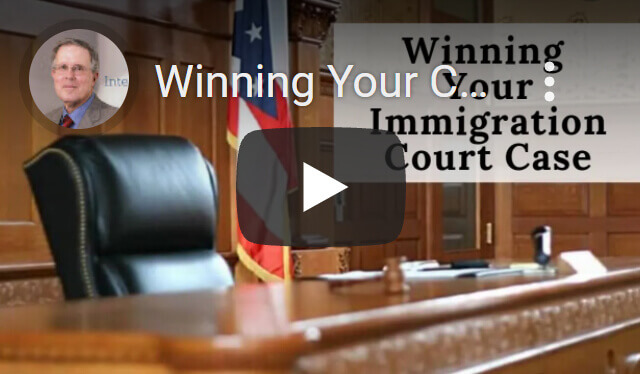Our “How To” US Immigration Videos cover the following subjects:
- How to Get a Temporary Work Visa
- How to Get a Green Card through Employment
- Employers: How to Survive an I-9 Audit
- Registered Nurses: Free Jobs and Green Cards
- Physicians: How to Immigrate to the United States
- How to Get a Green Card through Marriage
- How to Get a Green Card through Relatives
- How to Apply for Adjustment of Status
- How to Win Your Case in Immigration Court
- How to Choose an Immigration Attorney
- Attorney Shusterman’s Senate Testimony
- How to Become a U.S. Citizen
- Understanding the Child Status Protection Act – CPSA
- Unlawful Presence Bars and Waivers
- Success Stories
- Deferred Action for Childhood Arrivals – DACA
Subscribe to our “How-To” US Immigration Videos Channel.
You can stay up-to-date with the waiting times in the Visa Bulletin by subscribing to our Free E-Mail Newsletter. Also, see our Coronavirus – Immigration Updates page.
On May 22, 2001, Attorney Shusterman testified before the United States Senate Subcommittee on Immigration on Urban and Rural Healthcare Needs. There needs to be a temporary work visa for Registered Nurses, and more visas for Physicians who work in medically-underserved areas.

Selecting the right immigration attorney to represent you may be one of the most important decisions in your life. In this US immigration video, Attorney Carl Shusterman (former INS Trial Attorney, 1976-82) simplifies the process of choosing the right attorney for your needs.

Attorney Carl Shusterman explains how to become a US citizen through naturalization. Mr. Shusterman served as an INS Citizenship Attorney in the 1970s and conducted thousands of citizenship interviews.

Obtaining US citizenship is a major milestone for most immigrants to the United States. In this video, Carl Shusterman, a former INS Citizenship Attorney (1976-82) explains some of the basics of the naturalization process.

How to obtain US citizenship through parents and grandparents is one of the most complex portions of our immigration laws. Attorney Shusterman conducted hundreds of N-600 interviews for persons applying for acquisition of U.S. Citizenship when he worked for the U.S. Immigration Service.

Attorney Carl Shusterman (Former INS Trial Attorney, 1976-82) explains the green card marriage interview. He provides tips for preparing for your interview that he learned from conducting interviews for green card applicants for the US Government.

Personas de origen extranjero que ingresan en un matrimonio de buena fe con un ciudadano de los EE.UU. se consideran “familiares inmediatos” a los efectos de la obtencion de Residencia.

外國出生的人在與一名美 國公民建立一個真正的婚 姻后可被歸類為“直近的 親人” 而獲得綠卡。這將 免除他們面对 移民配額的限制,如果他 們是人在美國,也可讓他 們在美調整轉換 自己的身份狀態成為永 久居民。在這部影片 中,卡爾舒斯 特曼,前移民局檢察官 (1976 年至 1982), 其律師事務所近 30年來已幫助成千上萬的人 在美國 成為永久居民,將為您解 說基本的過程。

외국에서 태어나 미국 시민권자와 진실한 결혼을 한 사람들은 영주권 취득 절차상 “가까운 친척들”로 간주됩니다. 이것은 쿼타 제한에서 그들을 자유롭게 하고, 그들이 미국에 거주하고 있는 경우, 영주권자로 자신의 신분을 바로 조정할 수 있게 합니다. 전 INS 변호사(1976-82)로써 거의 30년 동안 수천명의 사람들이 영주권을 획득하도록 도와온 Carl Shusterman 변호사님께서 결혼을 통한 영주권 획득 과정의 기초를 이 비디오를 통해 설명하겠습니다.

Attorney Carl Shusterman (Former INS Attorney 1976-82) discusses how to sponsor your relatives for permanent residence. U.S. citizens may apply for their spouses, parents, sons and daughters, and brothers and sisters. Green card holders may apply for their spouses and unmarried sons and daughters.

Attorney Carl Shusterman (Former INS Attorney 1976-82) provides an introduction to the family preference categories under US immigration laws. He describes how US.citizens and green card holders can sponsor their relatives for permanent residence in the United States.

Attorney Carl Shusterman (Former INS Attorney 1976-82) provides insight into how to speed up the process of family-based immigration. He describes how you can bring your relatives to the U.S. sooner by changing preference categories, using alternate chargeability and by using the Child Status Protection Act (CSPA).

We explain how to qualify for an E-2 treaty investor visa. The investor must be a citizen of a country which has a treaty with the U.S. The amount of the investment must be “substantial” and the investment cannot be “marginal”. E-2 spouses can get EAD work permits.

Visa Attorney Carl Shusterman (Former INS Trial Attorney, 1976-82) explains how to qualify for an H-1B temporary work visa. He discusses the eligiblility requirements for both employers and employees and explains the difference between cap-subject and cap-exempt H-1Bs.

This US immigration video explains how to qualify for an L-1A visa as an executive or manager. You must have been employed abroad for the corporation, firm, or other legal entity (or an affiliate or subsidiary thereof) on a full-time basis for at least one continuous year out of the last three-year period to qualify.

This US immigration video explains how to qualify for an L-1B visa as an intracompany transferee with specialized knowledge. You must have been employed abroad for the corporation, firm, or other legal entity on a full-time basis for at least 1 continuous year out of the last 3-year period to qualify.

Attorney Carl Shusterman explains how to obtain an O visa for persons of extraordinary ability in the sciences, arts, education, business, or athletics, or for those who have a demonstrated record of extraordinary achievement in the motion picture or television industry.

Attorney Carl Shusterman discusses P-1 visas for athletes, artists and entertainers, P-2 visas for those on reciprocal exchange programs and P-3 visas where the individual or group is culturally unique.

Immigration Attorney Carl Shusterman (former INS Attorney, 1976-82) explains the EB-1, EB-2, EB-3 and EB-4 preference categories and how to obtain permanent residence through each of these categories. He describes the PERM process, national interest waivers and Schedule A occupations.

Immigration Attorney Carl Shusterman (Former INS Attorney 1976-82) gives an overview concerning employment-based immigration to the United States.

Immigration Attorney Carl Shusterman explains employment-based visa categories: EB-1 (priority workers), EB-2 (advanced degrees), EB-3 (professional, skilled and unskilled workers), EB-4 (religious workers et al), EB-5 (investors).

Attorney Carl Shusterman explains the eligibility requirements for adjusting your status in the United States. Adjustment of Status is legal jargon for obtaining permanent residence (also known as a “green card”) without having to leave the US.

The benefits of section 245(i) of the immigration law are many. Section 245(i) allows certain persons who have overstayed their visas or entered the United States without papers to adjust their status without having to leave the US. They must pay a fine, but they do not have to return to their home countries in order to apply for green cards.

Immigration Attorney Carl Shusterman (INS Attorney 1976-82) explains how to freeze the immigration age of children so they remain immediate relatives and how to do the mathematical formula for derivative beneficiaries so that your children can immigrate together with the rest of the family.

Immigration Attorney Carl Shusterman (Former INS Attorney 1976-82) explains the fundamentals of the Child Status Protection Act (CSPA). In this segment, Attorney Shusterman discusses the retroactive effect of the law and the ongoing litigation in Federal Court concerning the “automatic conversion” clause.

On June 19, 2012, Attorney Shusterman presented his oral argument before the United States 9th Circuit Court of Appeals in regard to the Child Status Protection Act (CSPA). A en banc panel of 11 judges agreed with us that the government’s interpretation of CSPA’s “automatic conversion” clause was too narrow.

Attorney Carl Shusterman explains the basics of the Child Status Protection Act (CSPA) and what to expect as our nationwide class action lawsuit heads to the Supreme Court. Unfortunately, the Supreme Court, by a 5-4 vote, overturned our CSPA victory before the 9th Circuit Court of Appeals.

For persons wishing to immigrate to the U.S., the process of getting a green card can become very difficult if they have accumulated “unlawful presence” in the US. Unlawful presence is a term of art and is not the same as being illegal. This immigration video is meant to demystify the concept unlawful presence.

Attorney Carl Shusterman (Former INS Trial Attorney, 1976-82) discusses how certain immediate relatives of U.S. citizens who entered the U.S. without inspection or are otherwise ineligible to adjust their status in the U.S., may apply for a waiver of unlawful presence while still in the U.S. before returning to their countries of origin for their green card interviews.

Attorney Carl Shusterman, a former INS Trial Attorney (1976-82), whose law firm has assisted thousands of persons across the U.S. during the past 30 years in winning their deportation and removal cases, explains how to win your case in Immigration Court.

“Cancellation of Removal” for a non-permanent resident is legal jargon for obtaining permanent residence (also known as a “green card”) from an Immigration Judge. In this immigration video, Carl Shusterman, a former INS Attorney (1976-82), explains the basics of the process.

Immigration Attorney Carl Shusterman explains how to present your asylum case in Immigration Court. He talks about how to prove that you may be persecuted in your home country on one or more of the 5 protective grounds. He also discusses withholding of removal and the Convention Against Torture.

To get a copy of your immigration file, you can submit a Freedom of Information Act (FOIA) request to the USCIS, ICE, CBP or the Immigration Court (EOIR). In fact, FOIA allows you to get a copy from almost every government agency using form G-639.

Immigration Attorney Carl Shusterman (former INS Trial Attorney 1976-82) explains how a 16-year-old orphan from Canada was allowed to obtain a green card and join his family in the United States.

Attorney Carl Shusterman (Former INS Attorney 1976-82) explains how a 14-year-old “illegal alien” from El Salvador beat deportation, gained permission to remain in the U.S. through suspension of deportation, and is now a distinguished university professor.

Carl Shusterman, a former INS Attorney (1976-82) who has assisted many employers in complying with I-9 audits over the past 30+ years, provides advice to employers seeking to comply with both I-9 and complex immigration anti-discrimination and document abuse laws.

Carl Shusterman, a former INS Attorney (1976-82) who has assisted many employers in complying with I-9 audits over the past 30+ years, provides advice to employers seeking to minimize their liability under the law.

Attorney Carl Shusterman (Former INS Attorney 1976-82) discusses the laws which determine how International Medical Graduates (IMGs) can come to the US for medical residencies and fellowships. He explains how physicians can obtain J waivers, H-1B status and permanent residence.

Attorney Carl Shusterman (Former INS Attorney 1976-82) discusses the laws which subject International Medical Graduates (IMGs) and Canadian physicians who complete their medical residencies and fellowships in the U.S. as J exchange visitors to the two-year foreign residency requirement.

Attorney Carl Shusterman explains how International Medical Graduates (IMGS) can obtain J waivers through (1) Interested Government Agencies (IGAs), (2) Exceptional Hardship and (3) Persecution. He also discusses how physicians of Extraordinary Ability can obtain O-1 visas.

Attorney Carl Shusterman explains how International Medical Graduates (IMGS) and Canadian physicians who are completing the medical residencies and fellowship using J-1 visas can be sponsored for waivers of the 2-year home residency requirement under the Conrad 30 program.

Attorney Carl Shusterman (Former INS Attorney 1976-82) explains how International Medical Graduates (IMGs) and Canadian physicians can obtain J waivers through Interested Government Agency (IGA) applications by Federal Agencies.

Attorney Carl Shusterman (Former INS Attorney 1976-82) explains how International Medical Graduates (IMGs) and Canadian physicians can obtain J waivers through by demonstrating exceptional hardship or persecution if they were forced to return to their home countries for two years.

Attorney Carl Shusterman (Former INS Attorney 1976-82) explains how International Medical Graduates (IMGs) and Canadian physicians can obtain permanent residence in the U.S. through family-based immigration, the green lottery, investment and a variety of other means.

Attorney Carl Shusterman (Former INS Attorney 1976-82) explains the process of obtaining green cards for IMGs and Canadian physicians without relying of employment sponsorship.

Attorney Shusterman tells you what you need to know about Deferred Action for Childhood Arrivals, or DACA, including how to know if you are eligible and how to know which documents to include in your application.








